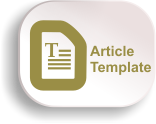Optimizing Creative Economic Potential through Training Implementation
DOI:
https://doi.org/10.55885/jucep.v4i2.416Keywords:
Creative Economy, Training Implementation, Tourism DestinationAbstract
This research explores the important role of support in designing programs and training as a key element in improving community welfare in the area. The focus is on the strategies undertaken to strengthen the capacity of local communities in managing and sustainably utilizing the resources found in Malenrang Beach, Panaikang Village, East Sinjai Regency. The results of this study provide an in-depth look at the importance of two-way dialogue between service providers and communities, the provision of up-to-date information, and needs-based training in the context of tourism destination development. As a result, this research provides an important contribution in efforts to advance the potential of the creative economy in the Malenrang Beach area, Panaikang Village, East Sinjai Regency.References
Al Hamid, R., Sugitanata, A., & Karimullah, S. S. (2023). Sinkronisasi Pendekatan Sosiologis Dengan Penemuan Hukum Islam Sui Generis Kum Empiris. Bertuah Jurnal Syariah Dan Ekonomi Islam, 4(1), 48-60. https://doi.org/10.56633/jsie.v4i1
Arifin, Y., Rizky, G., Adhicandra, I., Riadi, H. F., & Siswanto, A. (2024). Manajemen Sumber Daya Manusia: Dasar-Dasar MSDM. PT. Sonpedia Publishing Indonesia.
Arrizal, Z., & Sofyantoro, S. (2020). Birokrasi Pancasila: Jurnal Pemerintahan, Pembangunan dan Inovasi Daerah Pemberdayaan Ekonomi Kreatif dan UMKM di Masa Pandemi Melalui Digitalisasi. Birokrasi Pancasila: Jurnal Pemerintahan, Pembangunan dan Inovasi Daerah, 2(1), 39–48.
Bennett, N. J., & Dearden, P. (2014). Why local people do not support conservation: Community perceptions of marine protected area livelihood impacts, governance and management in Thailand. Marine policy, 44, 107-116. https://doi.org/10.1016/j.marpol.2013.08.017
Busro, M. (2018). Manajemen Sumber Daya Manusia In Manajemen Sumber Daya Manusia. Edisi Revisi Jakarta: Bumi Aksara, 391.
Fitriyanti, A., & Sinaga, O. S. (2024). Pengembangan Sumber Daya Manusia di Satuan Polisi Pamong Praja Balikpapan dalam Melaksanakan Tugas Penertiban Masyarakat. Journal of Management and Creative Business, 2(3), 301-313. https://doi.org/10.30640/jmcbus.v2i3.2910
Gautama, B. P., Yuliawati, A. K., Nurhayati, N. S., Fitriyani, E., & Pratiwi, I. I. (2020). Pengembangan desa wisata melalui pendekatan pemberdayaan masyarakat. BERNAS: Jurnal Pengabdian Kepada Masyarakat, 1(4), 355-369. https://doi.org/10.31949/jb.v1i4.414
Ibrahim, I., Pratama, I. N., & Zitri, I. (2024). Pelatihan Pengembangan Ekonomi Kreatif Bagi Pekerja Migran Indonesia Di Malaysia. Jurnal Pemberdayaan Sosial dan Teknologi Masyarakat, 4(1), 90-98. https://doi.org/10.54314/jpstm.v4i1.2032
Irvin, R. A., & Stansbury, J. (2004). Citizen participation in decision making: is it worth the effort?. Public administration review, 64(1), 55-65. https://doi.org/10.1111/j.1540-6210.2004.00346.x
Lubis, H., Rohmatillah, N., & Rahmatina, D. (2020). Strategy of tourism village development based on local wisdom. Jurnal Ilmu Sosial Dan Humaniora, 9(2), 320-329. http://dx.doi.org/10.2139/ssrn.3948752
MacDonald, C. (2012). Understanding participatory action research: A qualitative research methodology option. The Canadian Journal of Action Research, 13(2), 34–50. https://doi.org/10.33524/cjar.v13i2.37
Muhanna, E. (2006). Sustainable tourism development and environmental management for developing countries. Problems and Perspectives in Management, 4(2), 14-30.
Nasir, M., Mahmudinata, A. A., Ulya, M., & Firdaus, F. A. (2023). Strategi Pemberdayaan Sekolah Sebagai Upaya Peningkatan Manajemen Pendidikan. Journal of International Multidisciplinary Research, 1(2), 799-816. https://doi.org/10.62504/mbznza39
Rahman, I., & Hakim, L. M. (2024). Development of Creative Economy Based on Local Wisdom in the Era of Digital Transformation Through Inclusive Education and Village Community Empowerment in Bantul Regency, Yogyakarta. BASKARA: Journal of Business and Entrepreneurship, 6(2), 184-195. https://doi.org/10.54268/baskara.v6i2.21629
Song, H., Park, C., & Kim, M. (2020). Tourism destination management strategy for young children: Willingness to pay for child-friendly tourism facilities and services at a heritage site. International Journal of Environmental Research and Public Health, 17(19), 7100. https://doi.org/10.3390/ijerph17197100
Streimikiene, D., Svagzdiene, B., Jasinskas, E., & Simanavicius, A. (2021). Sustainable tourism development and competitiveness: The systematic literature review. Sustainable development, 29(1), 259-271. https://doi.org/10.1002/sd.2133
Sudarsana, I. K. (2019). Analisis Kebutuhan Dan Pengembangan Sumber Daya Manusia Desa Wisata (Studi Kasus Pada Desa Wisata Jasri, Kabupaten Karangasem). Jurnal Ilmiah Hospitality Management, 10(1), 10–21. https://doi.org/10.22334/jihm.v10i1.157
Suprihanto, J., & Putri, L. P. (2021). Manajemen Sumber Daya Manusia. UGM PRESS.
Tahir, R., Ilma, A. F. N., Thamrin, S., Samsuddin, H., Hindarwati, E. N., Rusyani, E., ... & Sulaeman, M. K. (2023). Metode Penelitian Sumber Daya Manusia: Panduan Komprehensif. PT. Sonpedia Publishing Indonesia.
Teriasi, R., Widyasari, Y., Supardi, J. S., Merdiasi, D., Apandie, C., & Sepniwati, L. (2022). Pendampingan Ekonomi Kreatif Bagi Komunitas Ibu Rumah Tangga. Jurnal Pengabdian Masyarakat (abdira), 2(4), 1–9. https://doi.org/10.31004/abdira.v2i4.174

Downloads
Published
How to Cite
Issue
Section
License
Copyright (c) 2024 Journal of Universal Community Empowerment Provision

This work is licensed under a Creative Commons Attribution-ShareAlike 4.0 International License.














